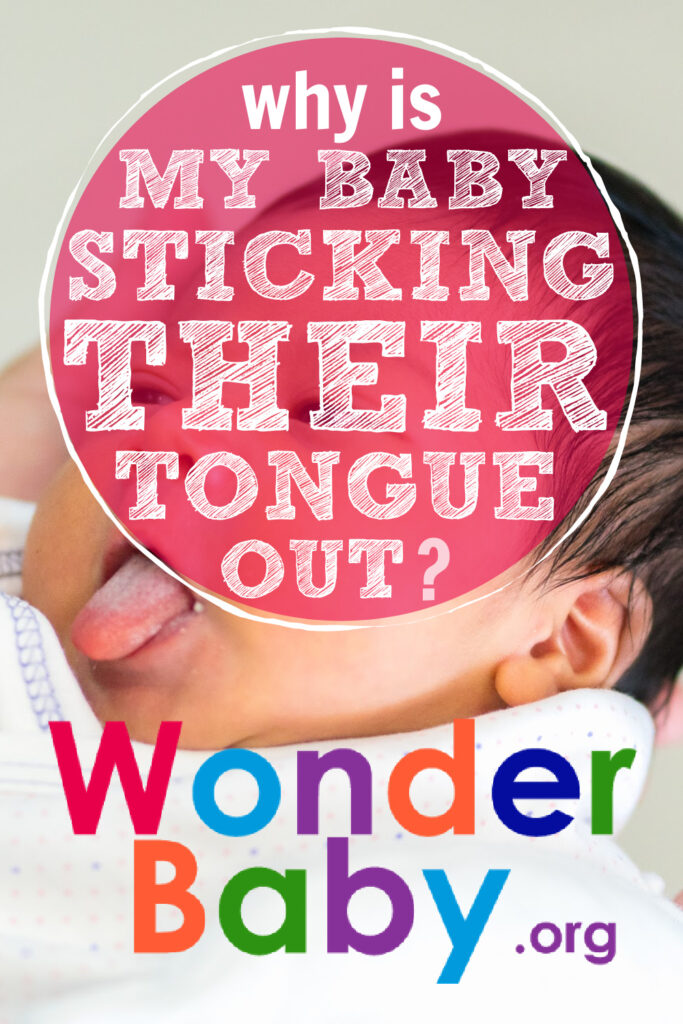Why Is My Baby Sticking Their Tongue Out?

- Your baby’s mouth is one of the first things they use to explore the world around them.
- Newborn babies have a strong natural reflex for sticking their tongue out to nurse or drink from a bottle
- Talk to your healthcare professional if your baby can’t fit their tongue inside their mouth.
- Some health conditions are associated with babies always sticking their tongue out.
New babies are constantly learning new things from the moment they’re born. Even while they’re still in-utero, they’re listening to the sound of your voice and moving their little arms and legs. When they’re born, this learning continues at a rapid pace.
Your baby is also born with some reflexes, like the tongue thrust reflex. Sometimes it can be difficult to determine whether your baby is sticking their tongue out because they’re learning, as a reflex, or because of a problem. Often, new mothers will find themselves wondering, Why is my baby sticking their tongue out?
Baby Sticking Out Their Tongue: When Not to Worry
If you notice your baby’s tongue sticking out, it’s usually just a reflex or a sign that they’re exploring the world. If it’s getting close to meal time, your baby might be sticking their tongue out because they’re hungry. As they get older, they might stick their tongue out in imitation of funny faces you make.
Common Reasons Why Babies Stick Out Their Tongue
While older kids may stick their tongues out to tease or make funny faces, your newborn doesn’t have much conscious control over her body or her tongue. Usually, newborn babies stick their tongues out because of a reflex. Babies commonly experiment with their tongues as they learn more oral motor skills.
Tongue Thrust Reflex
The tongue thrust reflex is a reflex that healthy newborns have to help protect them from choking. This reflex moves food away from the back of the throat and helps keep food from going down the wrong tube. Like the sucking reflex, your baby’s tongue sticking out is just a muscle reaction to food in the mouth.
Teething
You may notice that teething babies will chew on anything to soothe their aching mouths. During teething, your baby might even chew on their tongue to relieve the pressure on their gums.
Eating
Tongue thrusting can be a normal reflex when babies eat. This is especially true as your baby transitions from breast milk to semi-solid and solid foods. When your baby tries a new food or texture, they will use their tongue to push food around their oral cavity.
If your baby sticks their tongue out with a gag reflex, stop feeding them and give them a break. When you introduce solid foods, let your baby take their time with the new flavors and textures.

At What Age Do Babies Stop Sticking Their Tongues Out?
It’s perfectly normal for a newborn baby to stick their tongue out occasionally. The tongue thrust reflex should disappear by the time your baby is a few months old. At the latest, the reflex should be gone by 6 months of age.
Babies may continue sticking their tongues out to explore or mimic facial expressions for much longer than that. In fact, you might be able to think of an adult or two who sticks out their tongue when they’re concentrating on a difficult task.
Baby Sticking Out Their Tongue: When to Worry
While many babies stick out their tongues as a normal reflex, there are some babies with an underlying medical condition that may make them stick out their tongues more often or even constantly.
Breathing Problems
See your child’s doctor if they seem to have difficulty breathing because of their tongue or if they’re mouth breathing at night. Both of these signs may mean that your baby has a large tongue that does not fit in their small mouth.
Medical Conditions
There are a few medical conditions that can cause tongue protrusion. Generally, this is either due to poor muscle tone or variations in mouth or tongue size and shape.
Excessive drooling, low muscle tone, and poor musculoskeletal control are all problems that can be associated with tongues sticking out.
Down’s Syndrome
Down’s Syndrome is also known as trisomy 21. It’s caused by a baby having three copies of the 21st chromosome instead of just 2.
According to the University of Oxford, children with down syndrome commonly have problems with their tongues sticking out. This usually happens because they do not close their mouths at rest, and it often improves with age.
Pierre Robin Syndrome
John Hopkins medicine describes Pierre Robin syndrome as a rare congenital disorder that causes an underdeveloped jaw, tongue malposition, and upper airway obstruction.
Babies born with Pierre Robin Syndrome often have difficulty breathing and eating when they’re born. They also have trouble with repeated ear infections.
Beckwith Wiedemann Syndrome
Beckwith Wiedemann Syndrome is characterized by overgrowth of one side of the body or a part of one side of the body, an enlarged tongue, low blood sugar, and umbilical hernias.
This syndrome is genetic, meaning it’s passed down from parents to children. Boston Children’s Hospital explains that babies with Beckwith Wiedemann Syndrome may need surgery to make their tongue smaller so that they can breathe and eat normally.
Cerebral Palsy
Babies with Cerebral Palsy often have problems with tongue protrusion. Instead of low muscle tone, these babies can have muscle tightness and spasms that make it difficult or impossible to control their tongue.
These babies often have problems with sucking and feeding and may need feeding tubes to help keep them healthy. According to the CP Family Network, feeding tubes might be short-term or long-term.
Digeorge Syndrome
DiGeorge Syndrome is caused by deletion of part of chromosome 22. While there are variations in severity, babies born with DiGeorge Syndrome share many characteristics. They usually have low set ears, cleft palate, and heart defects.
Because of their changes in facial structure, many babies with DiGeorge syndrome have problems with sticking their tongue out.
Cleft lip or Cleft Palate
Mayo Clinic statistics show that about one in 1,600 babies in the United States are born with both cleft lip and cleft palate.
Cleft lip is when the baby’s lip does not come together during pregnancy. Cleft palate is when the baby’s roof of their mouth does not come together during pregnancy. These can happen together or individually.
Cleft lip or cleft palate should be repaired by the first 12 months of your baby’s life. They may need several surgeries throughout their life to completely correct the problem.
Oral Cancer
Oral cancer is a serious problem that can affect the lips, gums, and the roof and floor of the mouth. Cancer can also cause these parts of the mouth to grow larger and force the tongue out of the mouth due to its size.
Fortunately, studies by the National Institute of Cancer show that over 90% of oral tumors in babies are benign, or not cancerous. However, these tumors still need to be treated and removed as soon as possible.
Acid reflux
Acid reflux is extremely common in new babies, and usually resolves by itself with time. Babies’ digestive systems are immature, and the valve between the mouth and stomach may not close all of the way.
Signs of acid reflux in babies include arching their backs and crying often, vomiting frequently, severe diaper rash, and sticking their tongue out.
Most babies outgrow acid reflux by the time they’re 12 months old.

When to Seek Professional Advice
If you ever have questions or concerns about your baby’s health, you should reach out to your healthcare provider. You should definitely reach out to a healthcare professional if your baby:
- Always breathes through their mouth instead of their nose.
- Seems to be drooling excessively.
- Cannot close their mouth completely.
- Has trouble sucking or feeding.
- Makes grunting sounds when they take a breath.
FAQs
Should babies be able to stick their tongues out?
Babies should be able to stick their tongues out, but will only do so on command once they are older and able to follow instructions. Newborns usually stick their tongues out when they’re getting ready to breastfeed or take a bottle. Speak to your pediatrician if your baby has trouble eating and swallowing, and if they can’t seem to breathe normally through their nose.
Is tongue thrust worse in bottle fed babies?
It’s well known that breastfeeding has many benefits over bottle feeding. One of these benefits is the development of the oral cavity being different in bottle vs breastfed babies. Research shows that babies who are breastfed for less than 6 months or bottle fed for longer than 18 months are more likely to develop problems with the shape of their mouth, including tongue thrust problems.
Can pacifiers cause tongue thrust?
While pacifiers are fine for newborns and young babies, prolonged use of a pacifier has been known to cause some problems. This is especially true of your older child is constantly sucking on a pacifier.
Constant pacifier use in older age babies can change the shape of their mouth and cause tongue thrust. Pacifiers can affect the development of the tongue muscle, and in serious cases can cause eating problems and speech difficulties. Most physicians and dentists recommend that you stop giving your baby a pacifier before they reach the age of 3.

The information WonderBaby provides is not intended to be, and does not constitute, medical or other health advice or diagnosis and should not be used as such. Always consult with a qualified medical professional about your specific circumstances.
Related Posts

Eye Conditions and Syndromes, Visual Impairment
Neuralink Announces Plans to Restore Sight to the Blind with Brain Chip
Elon Musk’s company Neuralink has announced plans to begin human trials of its new “Blindsight” brain chip by the end of 2025.

Health & Nutrition
Can Baby Skin Care Products Expire?
Is that forgotten tube of diaper rash cream still safe to use? Learn more about the expiration dates of popular skin care products for infants.

Health & Nutrition
Boosting Immunity in Kids: 3 Tips for a Healthy Winter
Parents can help boost their kids’ immunity during cold and flu season by maintaining healthy eating, sleeping, and exercising habits in the winter.